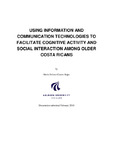Mostrar el registro sencillo del ítem
Using information and communication technologies to facilitate cognitive activity and social interaction among older Costa Ricans
| dc.contributor.advisor | Bygholm, Ann | |
| dc.creator | Castro Rojas, María Dolores | |
| dc.date.accessioned | 2022-03-09T13:48:52Z | |
| dc.date.available | 2022-03-09T13:48:52Z | |
| dc.date.issued | 2018 | |
| dc.identifier.citation | https://vbn.aau.dk/ws/portalfiles/portal/283925871/PHD_Maria_Dolores_Castro_Rojas_E_pdf.pdf | es_ES |
| dc.identifier.isbn | 978-87-7210-161-3 | |
| dc.identifier.issn | 2246-123X | |
| dc.identifier.uri | https://hdl.handle.net/10669/85981 | |
| dc.description.abstract | This thesis aims to identify and understand key elements that might be included in designing suitable learning interventions for enabling older adults using information and communication technologies (ICT) (i.e. computers, mobile devices and applications) for enhancing cognitive activity, increasing social interaction, and promoting successful and active aging. The study followed a design-based research (DBR) approach (Coto, 2010). This allowed incorporation of older adults’ and their educators’ opinions and suggestions into the design of a learning intervention using ICT. Primary goals were to: 1) stimulate autobiographical memory (ABM); 2) facilitate cognitive training; and 3) generate social interaction around such cognitive activities. Older adults participated in the implementation and evaluation of the designed learning intervention and collaborated in identifying areas of improvement. The research findings revealed that specific aspects such as age-related changes, negative emotions associated with the ICT learning process, and social support for ICT learning by older adults should be considered and included in optimal learning interventions. As main products of the research process, this thesis presents design principles and learning approaches that could guide future design efforts. The outcomes of the learning intervention revealed that older adults are willing and able to include ICT in their daily life for enhancing cognitive performance and social interaction. However, this type of intervention must be adapted to the characteristics, needs, and interests of this population. Results of the cognitive and social interaction activities suggested that ICT could be a potential avenue for cost- effective interventions aimed at reducing the risks of cognitive impairment and dementia. | es_ES |
| dc.language.iso | eng | es_ES |
| dc.source | Aalborg, Dinamarca: Universidad de Aalborg | es_ES |
| dc.subject | INFORMATION TECHNOLOGY | es_ES |
| dc.subject | ADULT LEARNING | es_ES |
| dc.subject | COSTA RICA | es_ES |
| dc.title | Using information and communication technologies to facilitate cognitive activity and social interaction among older Costa Ricans | es_ES |
| dc.type | tesis doctoral | es_ES |
| dc.description.procedence | UCR::Vicerrectoría de Investigación::Unidades de Investigación::Ciencias Sociales::Instituto de Investigaciones Psicológicas (IIP) | es_ES |
Ficheros en el ítem
Este ítem aparece en la(s) siguiente(s) colección(ones)
-
Psicología [597]


